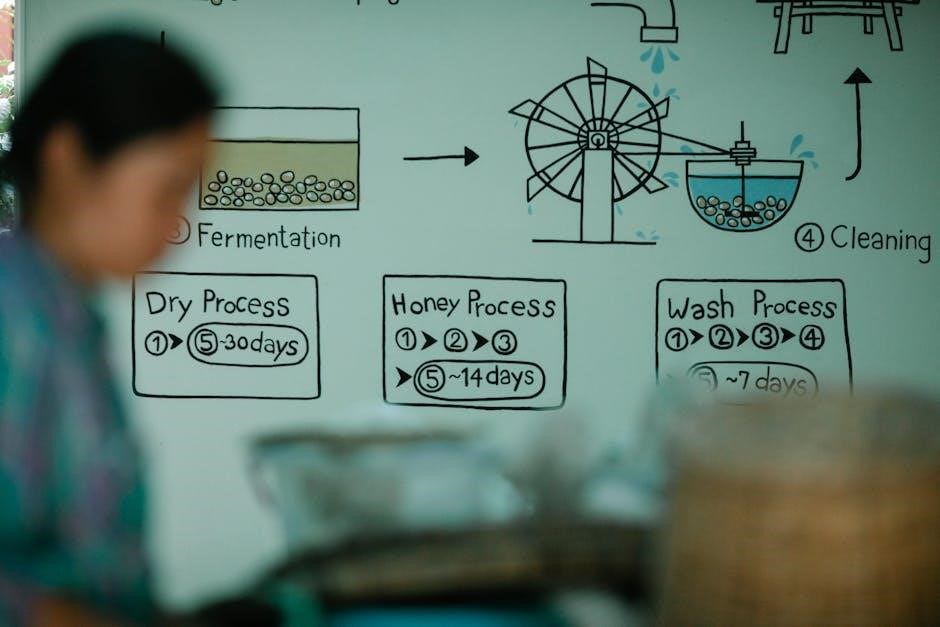An instructional facilitator plays a pivotal role in supporting educators by fostering professional growth and enhancing teaching strategies. They act as liaisons between teachers, resources, and school leadership, ensuring effective instructional practices and promoting student success through collaborative and innovative approaches.
Understanding the Concept and Importance
An instructional facilitator is an educator who supports teachers in improving their instructional practices and student outcomes. Their role is crucial for fostering a culture of continuous improvement, as they bridge the gap between educational resources and classroom implementation. By focusing on teacher growth and innovative strategies, facilitators enhance the overall quality of education, ensuring that educators are equipped to meet diverse student needs and adapt to evolving educational demands effectively.
Key Responsibilities of an Instructional Facilitator
An instructional facilitator coaches teachers, develops curriculum, and implements school-wide initiatives. They analyze data to improve instruction, integrate technology, and foster a collaborative learning environment, ensuring alignment with educational goals and enhancing student outcomes through innovative teaching strategies and professional development opportunities for educators;
Supporting Teacher Development
Instructional facilitators play a crucial role in mentoring and coaching teachers to enhance their instructional skills. They provide professional development opportunities, such as workshops and training programs, to help educators stay updated on best practices. By analyzing assessment data and offering tailored support, facilitators empower teachers to refine their strategies, addressing diverse student needs and fostering a culture of continuous improvement. This collaborative approach ensures educators are equipped to deliver high-quality instruction and improve student outcomes effectively.
Fostering Collaboration Among Educators
Instructional facilitators foster collaboration by creating opportunities for educators to share knowledge and strategies. They organize professional learning communities and facilitate meetings where teachers can discuss challenges and solutions. By encouraging peer coaching and collective problem-solving, facilitators help build a supportive environment where educators can thrive. This collaborative approach not only enhances teaching practices but also promotes a culture of shared responsibility, leading to improved student outcomes and a stronger educational community.

Skills and Qualifications Required
Instructional facilitators need strong leadership, communication, and curriculum development skills. They should have teaching experience, a deep understanding of educational strategies, and the ability to analyze data effectively.
Leadership and Communication Skills
Effective instructional facilitators must possess strong leadership and communication skills to guide educators and foster collaboration. They should be adept at articulating ideas clearly, listening actively, and motivating teachers. Leadership skills enable them to influence positive change, while excellent communication ensures seamless coordination among stakeholders. These abilities are crucial for building trust, resolving conflicts, and implementing successful instructional strategies that benefit both teachers and students alike in educational settings.
Curriculum Development Expertise
Instructional facilitators bring deep knowledge of curriculum design and implementation, aligning it with educational standards. They analyze learning objectives, integrate innovative resources, and ensure coherence across subjects. Their expertise helps teachers adapt curricula to meet diverse student needs, fostering engaging and effective learning experiences. By staying updated on educational trends, facilitators ensure that curricula remain relevant and impactful, supporting both teacher development and student achievement in dynamic educational environments;

The Impact of Instructional Facilitators on Teacher Development
Instructional facilitators significantly enhance teacher development by providing professional growth opportunities, fostering collaboration, and offering targeted support, enabling educators to refine their practices and stay updated on innovative strategies.
Professional Growth Opportunities
Instructional facilitators create pathways for educators to enhance their skills through workshops, training programs, and peer coaching. These opportunities foster a culture of continuous improvement, enabling teachers to adapt to new methodologies and technologies. By providing personalized support and resources, facilitators empower educators to refine their practices, leading to more effective teaching strategies and improved student outcomes. These growth opportunities ensure teachers remain updated on best practices, fostering a dynamic and evolving educational environment.
Enhancing Teaching Strategies
Instructional facilitators empower teachers to adopt innovative teaching methods tailored to diverse student needs. By introducing technology tools, differentiated instruction, and data-driven approaches, facilitators help educators refine their practices. They encourage the integration of real-world applications and collaborative learning, fostering engagement and deeper understanding. These strategies not only enhance teaching effectiveness but also align with modern educational standards, ensuring students receive a relevant and impactful learning experience. The goal is to create adaptive and dynamic classrooms that cater to all learners.

Technology Integration in Instructional Facilitation
Technology integration empowers instructional facilitators to enhance teaching methods through digital tools and blended learning, fostering student engagement and personalized learning experiences.
Using Digital Tools for Effective Learning
Digital tools enhance learning by providing interactive and engaging experiences. Instructional facilitators leverage platforms like learning management systems, interactive simulations, and collaboration software to support personalized instruction. These tools enable real-time feedback, data-driven decision-making, and accessible resources, fostering a dynamic learning environment. By integrating technology, facilitators empower educators to cater to diverse student needs, promoting innovation and equity in education. Effective use of digital tools ensures that teaching strategies remain relevant and impactful in a rapidly evolving educational landscape.
Blended Learning Approaches
Blended learning combines traditional instruction with digital tools, offering flexibility and personalized learning experiences. Instructional facilitators design hybrid models, integrating online resources and in-person activities to meet diverse student needs. They utilize learning management systems and multimedia to create engaging lessons. This approach allows for data-driven assessments and real-time feedback, ensuring tailored support for educators and students. By balancing technology and face-to-face interaction, facilitators enhance learning outcomes and foster a collaborative educational environment that adapts to modern teaching demands.

Data-Driven Decision Making
Instructional facilitators use assessment data to guide teaching strategies, ensuring informed decisions that enhance student outcomes and instructional effectiveness through continuous monitoring and analysis of progress.
Using Assessment Data to Improve Instruction
Instructional facilitators analyze assessment data to identify trends, inform teaching strategies, and monitor student progress. By leveraging tools like Google’s advanced search filters, they refine data analysis to pinpoint areas needing improvement. This data-driven approach supports targeted interventions, enhances teacher development, and ensures personalized learning strategies are implemented effectively, ultimately fostering student success and instructional excellence.
Monitoring Student Progress
Instructional facilitators play a key role in tracking student learning outcomes, ensuring alignment with educational goals. By utilizing digital tools and data-driven strategies, they identify areas where students may need additional support. Regular progress monitoring helps educators adjust teaching methods, fostering a more personalized and effective learning environment. This continuous oversight ensures that instructional strategies remain targeted and impactful, ultimately enhancing student achievement and educational success.

Supporting Diverse Learner Needs
Instructional facilitators ensure inclusive education by addressing varied learning styles, abilities, and cultural backgrounds. They implement tailored strategies to meet individual student needs, fostering an equitable learning environment that promotes academic and social growth for all learners.
Personalized Learning Strategies
Instructional facilitators implement personalized learning strategies by tailoring instruction to meet individual student needs. They utilize data-driven assessments to identify learning gaps and adapt teaching methods accordingly. By incorporating differentiated instruction and inclusive practices, facilitators ensure that all learners, regardless of their abilities, receive targeted support. This approach fosters a dynamic learning environment where students can thrive academically and socially, promoting equity and maximizing each student’s potential.
Inclusive Education Practices
Instructional facilitators promote inclusive education by ensuring diverse learner needs are met. They collaborate with teachers to adapt instructional materials and strategies, fostering an environment where all students can participate meaningfully. By integrating universal design for learning (UDL) principles and differentiated instruction, facilitators help create accessible learning experiences. This approach ensures that students with varying abilities, cultures, and backgrounds receive equitable opportunities for engagement and success, aligning with the facilitator’s role in supporting diverse educational needs.

Continuous Professional Development
Instructional facilitators engage in workshops, training programs, and peer coaching to enhance teaching strategies and stay updated on best practices, fostering ongoing growth and innovation in education.
Workshops and Training Programs
Workshops and training programs are essential for instructional facilitators to enhance their skills and stay updated on educational trends. These programs often cover topics such as curriculum design, technology integration, and effective teaching strategies. They provide hands-on experiences and opportunities for collaboration with peers. Many programs are offered in both in-person and online formats, ensuring accessibility for all facilitators. By participating, instructional facilitators gain practical tools and knowledge to support teachers more effectively, leading to improved student outcomes and a more dynamic learning environment.
Peer Coaching and Mentorship
Peer coaching and mentorship are vital components of instructional facilitation, fostering professional growth among educators. Experienced facilitators mentor teachers, providing guidance and support to enhance instructional practices. This collaborative approach encourages educators to share strategies, reflect on teaching methods, and adapt to new educational trends. Through regular feedback and joint planning, peer coaching strengthens teaching quality and builds confidence, ultimately benefiting both educators and students. This personalized support system is key to sustained professional development and improved classroom outcomes.

Best Practices for Effective Instructional Facilitation
Active listening, collaboration, and trust-building are essential for effective instructional facilitation. Facilitators should stay updated on educational trends, fostering a positive environment that encourages teacher growth and innovation.
Building Trust and Rapport
Building trust and rapport is crucial for effective instructional facilitation. Facilitators must establish open communication, active listening, and empathy to create a supportive environment. Demonstrating reliability, transparency, and a non-evaluative stance fosters trust among educators. Celebrating successes and addressing challenges collaboratively strengthens relationships, ensuring educators feel valued and empowered. These efforts lay the groundwork for productive partnerships and meaningful professional growth.
Creating a Positive Learning Environment
Creating a positive learning environment involves fostering inclusivity, respect, and engagement. Instructional facilitators promote differentiated instruction and inclusive practices, ensuring all learners feel valued. They encourage active participation and collaboration, leveraging technology and diverse resources to cater to varied learning styles. By modeling supportive behaviors and addressing individual needs, facilitators cultivate a culture of belonging and motivation, enabling educators and students to thrive in dynamic and adaptive educational settings.

Future Trends in Instructional Facilitation
Future trends include integrating emerging technologies like AI and VR to enhance learning experiences. Facilitators will leverage these tools to create personalized, immersive, and adaptive educational environments, fostering deeper engagement.
Emerging Technologies in Education
Emerging technologies like artificial intelligence (AI), virtual reality (VR), and blended learning are revolutionizing education. AI adapts learning experiences, while VR creates immersive simulations. Instructional facilitators leverage these tools to enhance teaching strategies, enabling personalized learning and real-time data analysis. Such innovations not only modernize classrooms but also empower educators to address diverse student needs effectively, ensuring a more dynamic and engaging educational environment for the future. These technologies are pivotal in shaping the next generation of instructional practices.
Evolution of Facilitation Strategies
Facilitation strategies have evolved from traditional methods to more dynamic, technology-integrated approaches. Modern instructional facilitators now emphasize collaborative learning, data-driven decision-making, and personalized instruction. The integration of digital tools and real-time feedback mechanisms has transformed how facilitators support teacher development. This shift ensures that educators can adapt to changing educational landscapes, fostering innovative teaching practices and improving student outcomes. These advancements highlight the critical role of facilitators in aligning instructional strategies with 21st-century learning demands.
